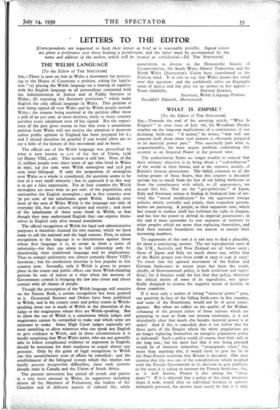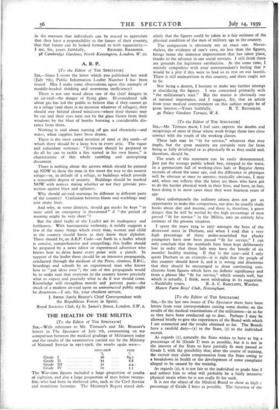WHAT IS EMPIRE ?
[To the Editor of THE SPECTATOR] SIR,—Towards the end of his arresting article, " What Is Empire? " in your issue of July 7th, Sir Wyndham Deedes touches on the long-run implications of a continuance of our declining birth-rate. " A nation," he writes, " that will not concern itself about these vital matters is obviously prepared to let material power pass." This succinctly puts what is, unquestionably, the most urgent problem confronting this country as an Imperial Power at the present time.
The authoritarian States no longer trouble to conceal that their ultimate objective is to bring about a " redistribution" of the world in their favour, and at the expense, mainly, of Britain's oversea possessions. The belief, common to all the ruling groups of those States, that this country is decadent springs not so much from the fact of our falling birth-rate as from the complacency with which, to all appearances, we accept this fact. Nor are the " geo-politicians " of Japan, Italy and Germany remiss at finding in biological laws of sur- vival the " moral justification " for the aggressive foreign policies which, severally and jointly, their respective govern- ments are pursuing. A people, so their argument runs, which has ceased to replace itself has forfeited the right to Empire, and has lost the power to defend its imperial possessions ; in the end it must surrender its vast expanses of territory to other peoples which are more than replacing themselves, and find their national boundaries too narrow to sustain their increasing numbers.
To arguments of this sort it is not easy to find a plausible, let alone a convincing, answer. The net reproduction rates of the U.K., Australia and New Zealand are all below unity ; those of Japan and Italy are much above one, whilst that of the Reich proper rose from 0.698 in 1933 to 0.91 in 1935!
To retort that the upward movement of the Italian and German birth-rates in recent years has been the result, chiefly, of Governmental policy, is both irrelevant and super- ficial ; for it brushes aside the fact that that policy, whatever the ethical merits of some of its ingredients, was speci- fically designed to reverse the negative trends of fertility in those countries.
If it were only a matter of letting "material power " pass, our passivity in face of the falling birth-rates in this country, and some of the Dominions, would not be of great conse- quence. But when we reflect on the quality of the Weltan- schauung of the present rulers of those nations which are preparing to oust us from our oversell territories, is it not abundantly clear that much else besides material power is at stake? And if this is conceded, does it not follow that for those parts of the Empire where the white populations are no longer replacing themselves an energetic population policy is indicated? Such a policy could, of course, bear fruit only in the long run ; but the mere fact that it was being pursued would be of immense immediate " propaganda value," for, more than anything else, it would serve to give the lie to the Nazi-Fascist assertion that Britain is decadent. One may surmise that this was one of the considerations which weighed with the French Government in its decision to give publicity to the steps it is taking to increase the French birth-rate—for, as is well known, France is also among the " deca- dents "! If it is objected that a policy of this kind, whatever shape it took, would abut on individual freedom in spheres intimately personal, the answer must surely be that it is only in the measure that individuals can be roused to appreciate that they have a responsibility to the future of their country, that that future can be looked forward to with equanimity.—











































 Previous page
Previous page